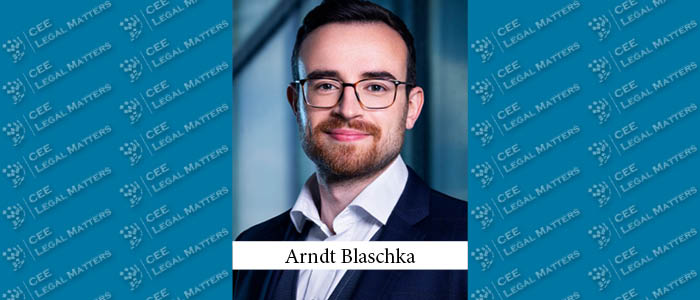From Alan Ladd’s Shane to Clint Eastwood’s Man with No Name, from Julie Andrews’ Mary Poppins to Gal Gadot’s Wonder Woman, and from Michael Rennie’s Klaatu to Chris Pratt’s Peter Quill, the phenomenon of help coming from far away is a familiar one. A similar dynamic can be found in CEE’s legal market.
It’s a truism that domestic and regional law firms in Central and Eastern Europe serve clients in the region from offices on the ground in CEE. But that tautological inevitability doesn’t apply to the international law firms doing business in the two dozen countries in Central and Eastern Europe – many, in fact, from offices outside the region.
To explore this particular phenomenon, we spoke with partners at several well-known international firms with CEE practices based outside the region itself.
Slaughter and May
Slaughter and May is famously conservative about its footprint, and although the firm does have a limited foreign presence (with offices in Brussels, Hong Kong, and Beijing), it alone residents of the Magic Circle has no offices in CEE – and no plans to open any anytime soon. “Everyone knows times in some parts of the CEE aren’t as good as they were,” says Partner Richard Jones, who says few investors in the region are able to pay the fees that major international law firms require, “unless you’re a foreign or major local client that sees the need for real quality.”
And in any event, Jones adds, “in the age of global communications [many local offices] just aren’t necessary.”
Still, Slaughter and May Partner Jonathan Marks insists that his firm is productively engaged with CEE. “We do regard the region with interest,” he says. “There may be a perception that we’re only interested in large corporates and very big deals. But that’s not true.”
In reaching those local clients, Slaughter and May focuses its business development efforts in CEE primarily on demonstrating its capabilities to its existing client base and on establishing solid relationships with potential referral partners in the region. Jones says, “most of our work either comes from clients who ask for us – they know us already and are going into the region – or from opportunities from local firms.”
While the firm values what Jones describes as its “many informal and non-exclusive relationships” with domestic firms in the region, it also insists on maintaining its flexibility. Still, Jones says, “our relationships with these referral firm has changed over time, but I’m delighted that we still work with firms that we first collaborated with when they were founded.”
And the firm engages in a committed and ongoing networking process, which Marks concedes can be tiring. “Lots of law firms come to say hi. That’s great, but we also find it useful to attend an event like the CEE Legal Summit where we can meet GCs and law firms in one go.”
In terms of how the firm’s focus on CEE is reflected in its internal structure, Jones explains that Slaughter and May divides the world into different regions, and allocates partners to each regions. He and Marks are responsible for CEE. Unsurprisingly, that group focuses on the larger markets of Poland, the Czech Republic, and Romania, but Jonathan Marks notes that “we are willing to look at opportunities in other countries as well.”
There are no partners from CEE at the moment, though Marks emphasizes that some of the firms’s partners do have family connections in the region. There have also been secondees at the firm from the region, including from Poland and the Czech Republic. Jones explains that the Magic Circle firm’s fluid relationship with the firms in the region means bringing secondees on board can be a difficult prospect, “although,” he says, “we have had some successes.” According to Jones, “you have to have a relatively deep relationship with a firm to do that. Written business and legal English skills in some CEE countries can also be a bit hit and miss (although it is getting better very quickly). It’s a bit of a chicken and egg situation as well, of course. You can’t develop those deep relationships with firms without getting secondees, and it’s difficult to get secondees without the relationships.”
Ultimately, Jonathan Marks explains, “I am delighted to be spearheading our initiative in the CEE region with Richard Jones and the rest of the team. It is a vibrant and exciting area to cover and, having refocused our efforts in a number of key jurisdictions, we are pleased to see some real momentum expanding on our existing links with the leading independent firms as well as a growing list of the leading clients in the region.”
Reed Smith
Although Reed Smith has one office in Central and Eastern Europe – a shipping-focused base in Pireaus, outside Athens – it has no on-the-ground presence in the former Communist countries that form the core of CEE, and which the firm serves primarily from its London base.
Indeed, the firm is promoting its new “CESEE Team,” launched in October 2017 and led by Petar Orlic (who has Yugoslavian roots), the Greek Panagiotis Katsambas, the Hungarian Agnes Molnar, and the Croatian Josip Stajfer. Molnar, who joined the firm’s London office in June 2016 from Freshfields in Vienna, brought her strong CEE focus with her, and says that “when Petar came [in May 2017] I was very joyful, and we immediately began discussing this new platform.”
Orlic’s arrival from Faegre Baker Daniels was hardly coincidental. “This is our own initiative,” he says of the firm’s CESEE team, “since I knew Agnes was at the firm, which is one of the reasons I joined.” And Orlic says that “I think we’re the only firm that has a true CESEE team/desk based in London.” And he agrees with Molnar that the time is right. “It’s been booming – the IT side, funds, it’s like Silicon Valley money coming. Romania’s booming at the moment] [as is[ Bulgaria at the moment on the IT side.” And Orlic proposes a unique explanation for some of the growth, noting that “there’s been a brain drain in the region, so we’ve seen governments luring investors to give smart students incentive to stay.”
Despite its diverse leadership, Reed Smith’s CEE coverage stops at Ukraine’s eastern border. According to Molnar, “Russia is CIS – it’s something different.”
And as for the team’s work in CEE proper, Molnar believes the London focus is key. “More and more funds are looking into CESEE,” she explains, “and looking for higher yields or to diversify their portfolios. The strategy is to find the key players in London who have an interest in investing in the CESEE region. So the focus is on London-based clients. We don’t want to compete with Wolf Theiss, for instance.”
Orlic says that the firm’s limited CEE footprint is deliberate. “Our strategy is not to be on the ground.” Instead, he says, “we’re flexible,” and that the firm’s work in the region is based heavily on its “strong network” of local firms. The team’s BD efforts are “based on mutual referrals. We like to work with specific lawyers. We have preferred people at local firms.”
Orlic says he “speaks the lingo of CESEE,” and Molnar says the team’s capability goes beyond the linguistic. “Both of us are from the region, but it’s not to just speak the language. Through understanding the culture, we can add true value to our clients.”
“More and more funds are looking into CESEE,” she explains, “and looking for higher yields or to diversify their portfolios. The strategy is to find the key players in London who have an interest in investing in the CESEE region. So the focus is on London-based clients.
Cleary Gottlieb Steen & Hamilton
Like Skadden Arps, Orrick, Baker Botts, Jones Day, and Dechert, Cleary Gottlieb is one of a dozen or so international firms with a Moscow office representing its single CEE on-the-ground presence, though the firm also touts its Kazakhstan practice, which focuses “around large-scale privatization efforts.”
Cleary staffs most of its CEE work through what Partner David Gottlieb describes as “a mixture of resources in the UK and Russia.” Indeed, the firm has a significant Russian presence – it opened its doors in the Russian capital in 1991– and a longstanding relationship with the Russian government and many blue-chip Russian companies.
The firm’s focus on Russia and Kazakhstan is reflected in its personnel as well, unsurprisingly, as, although the firm has Russian and Kazakh partners, it – like Slaughter and May – has no CEE partners nor any current CEE secondees.
Regardless, the firm does significant work in the region. Gottlieb reports that “one of our main areas of focus in CEE is our Capital Markets practice,” and he points out that “we did a fair amount of work in Hungary in the 1990s, including working on the MATAV [now Magyar Telecom)] privatization,” and a number of more recent IPOs in Turkey, as well as DIGI’s 2017 IPO in Romania (see “The Travel Pays Off” boxes on pages 27 and 29).
Surprisingly, however, the firm doesn’t do much in CEE’s largest non-Russian market. “We don’t really do a lot of work in Poland,” Gottlieb says. “There’s a lot of competition there, and it’s a fairly saturated market.”
Of course, that’s not to say the firm turns Polish opportunities away. “Polish law firms come to visit regularly to pitch their services, thinking privatization work is coming,” Partner Polina Lyadnova (herself Russian) explains, “but nothing ever really comes of it.”
Business development tends to be a secondary concern at the firm, which gets most of its work in the region through RFPs (“that’s how it commonly works,” says Gottlieb) or as a result of its long-standing reputation as world-class Capital Markets experts.
Ultimately, the firm’s partners make no apologies about their small on-the-ground presence in CEE. “We have a smaller footprint than the Magic Circle firms and [firms like] White & Case,” Gottlieb says. “Our strategy isn’t to open up everywhere – we only open an office when there’s a real business case.” Lyadnova adds that, in the partners’ opinion, the importance of on-the-ground offices has shrunk in recent years anyway. “It’s very global at the moment,” she says. “People don’t look for geographies, they look for specialists.”
The Travel Pays Off
The partners we spoke to at Cleary Gottlieb, Reed Smith, and Slaughter and May were kind enough to describe for us some of the deals they’ve worked on in Central and Eastern Europe.
Cleary Gottlieb Steen & Hamilton
- Cleary Gottlieb represented J.P. Morgan Securities plc and Citigroup Global Markets Limited as representatives of the initial purchasers in a high-yield bond issuance by Cable Communications Systems N.V. of EUR 350 million of 5.0% senior secured notes due 2023, guaranteed by RCS & RDS. The transaction launched on October 10, 2016, priced on October 12, 2016, and settled on October 26, 2016. Cable Communications Systems N.V. is the controlling shareholder of RCS & RDS, which is a leading provider of telecommunications services in Romania and Hungary and has international operations in Spain and Italy.
- Cleary Gottlieb acted as international counsel to the underwriters, led by Citigroup and Deutsche Bank, in the initial public offering of shares of Digi Communications N.V. (Digi) and listing on the Bucharest Stock Exchange. The transaction closed on May 15, 2017. The offering consisted of a sale of shares by a number of the existing minority shareholders and involved a public offering to retail investors in Romania as well as a global offering to institutional investors. The offering price was RON 40 per share, implying a market capitalization of Digi of EUR 820 million. Cleary also acted as counsel to the initial purchasers in a 2016 high-yield bond issuance and to Digi in a 2013 high-yield bond issuance. Digi is a leading provider of telecommunication services in Romania and Hungary.
Reed Smith
- In 2017, the firm advised a special purpose project company incorporated in Serbia and its sponsors (Greek and Dutch incorporated entities) on a EUR 53 million real estate development finance transaction in connection with real estate in Belgrade.
- In 2017, the firm advised UniCredit on Project DeLorean due diligence of its CEE business portfolio, conducted a feasibility study on the transferability of the loan portfolio and the security attached to the loans, and advised UniCredit on the transfer of security interests registered in 14 CESEE jurisdictions.
- In 2015/2016, the firm represented a leading U.S. processor and distributor of value-added, flat-rolled steel on its USD 500 million investment in Serbia
Slaughter and May
- The firm advised Stock Spirits, a leading manufacturer of vodka in Poland, on all of its listed company obligations including its ongoing relationship with its activist shareholder, Western Gate, founded by the owner of Poland’s leading wholesaler, Eurocash, and on Stock’s revisions to its debt financing facilities.
- The firm advised GE Capital International Holdings on MONETA Money Bank (formerly known as GE Money Bank a.s., Moneta) and GE Capital International Holdings on the initial public offering of the majority of Moneta's shares, and the subsequent sales of MONETA Money Banks shares for approximately CZK 16.9 billion.
- The firm advised SEGRO European Logistics Partnership on its debut issue of EUR 500 million Guaranteed Notes due 2023 and associated refinancing exercise.
We would like to thank the following individuals for their contribution to this article:
- Jonathan Marks, Partner, Slaughter & May
- Richard Jones, Partner, Slaughter & May
- Polina Lyadnova, Partner, Cleary Gottlieb Steen & Hamilton
- David Gottlieb, Partner, Cleary Gottlieb Steen & Hamilton
- Petar Orlic, Partner, Reed Smith
- Agnes Molnar, Partner, Reed Smith
This Article was originally published in Issue 4.12 of the CEE Legal Matters Magazine. If you would like to receive a hard copy of the magazine, you can subscribe here.
























